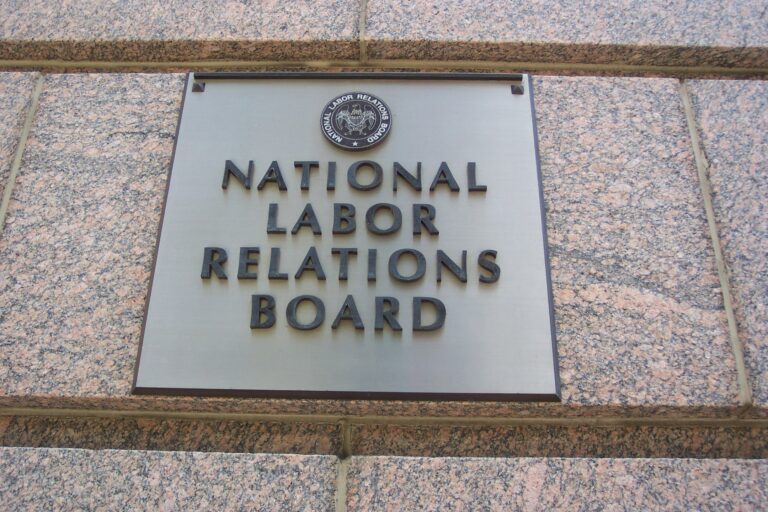
Sharon Block is a Professor of Practice and the Executive Director of the Center for Labor and a Just Economy at Harvard Law School.

Benjamin Sachs is the Kestnbaum Professor of Labor and Industry at Harvard Law School and a leading expert in the field of labor law and labor relations. He is also faculty director of the Center for Labor and a Just Economy. Professor Sachs teaches courses in labor law, employment law, and law and social change, and his writing focuses on union organizing and unions in American politics. Prior to joining the Harvard faculty in 2008, Professor Sachs was the Joseph Goldstein Fellow at Yale Law School. From 2002-2006, he served as Assistant General Counsel of the Service Employees International Union (SEIU) in Washington, D.C. Professor Sachs graduated from Yale Law School in 1998, and served as a judicial law clerk to the Honorable Stephen Reinhardt of the United States Court of Appeals for the Ninth Circuit. His writing has appeared in the Harvard Law Review, the Yale Law Journal, the Columbia Law Review, the New York Times and elsewhere. Professor Sachs received the Yale Law School teaching award in 2007 and in 2013 received the Sacks-Freund Award for Teaching Excellence at Harvard Law School. He can be reached at [email protected].
During this Democratic primary season, there has been much focus on what divides the candidates – who is for Medicare for All and who is for Medicare for anyone who wants it, who is for a Green New Deal and who is for a carbon tax, who wants structural change and who wants incremental change. And yet, there is a surprising area of consensus on one very big idea. Almost all of the candidates for the Democratic Party’s nomination have come out in support of an idea at the heart of our Clean Slate for Worker Power recommendations – sectoral bargaining.
As we explained last month in Newsweek, the biggest change proposed in our Clean Slate for Worker Power recommendations would be to allow workers to build power and engage in collective bargaining across entire industries, not just within individual firms. For more than 80 years, U.S. labor law has constrained workers to organizing in a decentralized system – often called “enterprise bargaining.” This workplace-by-workplace system of bargaining is structurally incapable of allowing workers to build power sufficient to countervail corporate power. In a sectoral bargaining system, the law provides robust support for worker organizing and bargaining at the firm level while also giving workers the right to negotiate economic terms across whole sectors of the economy. The effect of this significant structural shift is to take wages largely out of competition, relieving the downward pressure on pay that has so greatly contributed to our historically high levels of income inequality.
The Democratic Party’s nominee in 2016, Hillary Clinton, never uttered the word “sectoral” in close proximity to the word “bargaining.” But, in this cycle, ten of the serious candidates contesting for the Democratic nomination have put forth proposals that include some form of sectoral bargaining. One former candidate – Senator Cory Booker – even touted his sectoral bargaining proposal during a debate, promising to make sure that “we have sectoral bargaining so that unions from the auto workers all the way to fast food workers can ensure that we improve workers’ conditions.”
Candidates across the ideological spectrum of the Democratic Party have embraced sectoral bargaining as a key economic policy:
- Joe Biden: Former Vice President Biden promises to create a cabinet-level working group to focus on promoting union organizing and collective bargaining. One charge to that group would be to “work[] with unions and trade associations to further explore the expansion of sectoral bargaining, where all competitors in an industry are engaged in collective bargaining with a single or multiple unions.”
- Mike Bloomberg: Former Mayor Bloomberg put forth a sectoral bargaining proposal that would “promote sectoral bargaining in industries where workers are highly organized but face barriers to unionization.”
- Cory Booker: As part of his “Opportunity and Justice” plan, Senator Booker called for sectoral wage boards, noting that “[s]ectoral bargaining allows workers to organize to raise wages and standards across entire industries.”
- Steve Bullock: In his plan, former Governor Bullock promised to “fight for universal sectoral bargaining that sets a floor for wages, benefits, and working conditions for workers in different economic sectors — including independent contractors.”
- Pete Buttigieg: Former Mayor Buttigieg’s labor policy highlighted his support for “empower[ing] workers to band together outside the firm through multi-employer bargaining.” Specifically, he proposes that “[w]orkers at unionized worksites of employers in the same line of work who compete with one another will be allowed to decide to bargain on a multi-site or multi-employer basis, and their employers will be required to bargain toward a collective bargaining agreement.”
- Julian Castro: Former Sectary Castro included in his labor policy, a commitment to advance the use of sectoral bargaining, proposing to “establish wage boards to set negotiated sector-wide wages and increase the use of contract extensions to extend the benefits of bargaining to all workers.”
- Beto O’Rourke: Former Rep. Beto O’Rourke had proposed reforming labor law “to make it easier for workers to negotiate wages and benefits across industries — requiring employers to bargain with employees on a multi-employer basis if a majority of employees at multiple worksites vote to do so. This would prevent employers from engaging in the race to the bottom on wages and working conditions, encouraging them to compete with one another through productivity and innovation.”
- Bernie Sanders: Senator Sanders commits that when president he would “work with the trade union movement to establish a sectoral collective bargaining system that will work to set wages, benefits and hours across entire industries, not just employer-by-employer.”
- Elizabeth Warren: Senator Warren proposes that, as president, she would support “amend[ing] federal labor law to promote sectoral bargaining so that workers across industries – fast food workers at McDonald’s, Burger King, and Taco Bell, or child care workers across different employers – can band together and bargain alongside labor organizations to improve wages, hours, and working conditions on an industry-wide basis.”
- Andrew Yang: In keeping with his focus on the impact of technology on the workforce, Yang committed to “encourage[ing] sectoral bargaining for tech and gig workers so union members can easily move between jobs while expecting the same floor wages and working conditions.”
While the details of these plans may differ, their message is consistent and profound. They must be understood as (1) a recognition that our current labor law is irreparably broken and (2) a commitment to finding a new system. Democratic candidates for decades have run on a platform of trying to fix our labor law. The breadth of support for sectoral bargaining suggests that whoever the candidate may be this year, that candidate will be advancing the core Clean Slate recommendation to fundamentally redesign labor law in the U.S.









Daily News & Commentary
Start your day with our roundup of the latest labor developments. See all
July 2
Block, Nanda, and Nayak argue that the NLRA is under attack, harming democracy; the EEOC files a motion to dismiss a lawsuit brought by former EEOC Commissioner Jocelyn Samuels; and SEIU Local 1000 strikes an agreement with the State of California to delay the state's return-to-office executive order for state workers.
July 1
In today’s news and commentary, the Department of Labor proposes to roll back minimum wage and overtime protections for home care workers, a federal judge dismissed a lawsuit by public defenders over a union’s Gaza statements, and Philadelphia’s largest municipal union is on strike for first time in nearly 40 years. On Monday, the U.S. […]
June 30
Antidiscrimination scholars question McDonnell Douglas, George Washington University Hospital bargained in bad faith, and NY regulators defend LPA dispensary law.
June 29
In today’s news and commentary, Trump v. CASA restricts nationwide injunctions, a preliminary injunction continues to stop DOL from shutting down Job Corps, and the minimum wage is set to rise in multiple cities and states. On Friday, the Supreme Court held in Trump v. CASA that universal injunctions “likely exceed the equitable authority that […]
June 27
Labor's role in Zohran Mamdani's victory; DHS funding amendment aims to expand guest worker programs; COSELL submission deadline rapidly approaching
June 26
A district judge issues a preliminary injunction blocking agencies from implementing Trump’s executive order eliminating collective bargaining for federal workers; workers organize for the reinstatement of two doctors who were put on administrative leave after union activity; and Lamont vetoes unemployment benefits for striking workers.